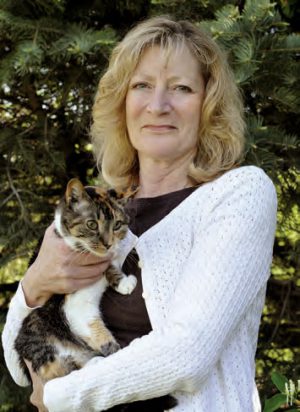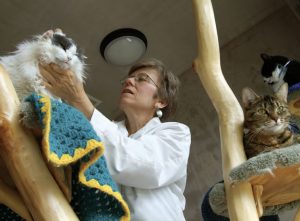Population medicine, infectious disease, public health, animal welfare, and small animal overpopulation are pervasive problems, yet there remains a lack of expertise, services, resources, and research available to tackle the problems. MSU alumni have played an important role in the emergence of shelter medicine as a discipline and the effort to make shelter medicine a specialty recognized by the American Board of Veterinary Practitioners (ABVP).
Three MSU DVM alumnae, Claudia Baldwin (DVM ’82) Janet Scarlett (’72), and Melinda Merck (’88), serve on the Organizing Committee for a Certification in Shelter Medicine, which is petitioning for an ABVP-recognized shelter medicine specialty.
Each works on a range of issues related to shelter medicine and pet overpopulation: Scarlett’s focus is on epidemiological issues; Merck now works on international animal welfare and veterinary forensics (see Merck's story); and Baldwin’s expertise includes clinical and investigatory work in population medicine and feline reproduction/overpopulation. They share a commitment to collaboration across disciplines and an understanding that no individual or organization succeeds alone.
Claudia Baldwin (DVM '82)

CLAUDIA BALDWIN is associate professor in Veterinary Clinical Sciences at Iowa State University College of Veterinary Medicine, director of the university’s Maddie’s® Shelter Medicine Program, and a faculty member of the Center for Food Security and Public Health and the ISU Animal Welfare Group. She is board certified in internal medicine and a board member of the Iowa Federation of Humane Societies.
While she serves in a leadership capacity for many professional organizations, she is most proud of her work as an educator and mentor. Baldwin has developed shelter medicine classes, outreach programs, and worked closely with student associations, particularly the ISU Feral Cat Alliance, which gives students an understanding of overpopulation as well as significant surgical experience.
“I’m an educator,” says Baldwin. “That’s what it’s about for me. This has all really changed things for our students, but the effects extend beyond students. We’re actually changing the relationship between veterinarians and shelters. Students are getting a better understanding of the issues, and practicing veterinarians are now developing an awareness of overpopulation. They are now approaching us.”
Baldwin consults locally and across Iowa, but also nationally and internationally on population medicine, infectious disease, public health, and feline reproduction/overpopulation.
“I’m an educator. That’s what it’s about for me… We’re actually changing the relationship between veterinarians and shelters.”
“I had the opportunity to speak in Belgrade, Serbia,” she says. “After my first day there, I said to myself, ‘Wow,’ and I went back to my room and re-wrote my presentation. They were building their first shelter. The conversation needed to start at the very beginning.” Baldwin arranged to send two students to Belgrade to help train professionals at their university. This is the kind of collaboration she is talking about when she says, “Nobody does anything alone.”
Baldwin cites Christopher Brown, the current dean of the MSU College of Veterinary Medicine, as an important influence on her entrance into shelter medicine. Brown was an instructor when Baldwin studied at MSU, and he was later her chair at Iowa State.
“Chris told me, ‘You have a background in infectious diseases and birth control and you’ve been doing pro bono work at shelters,’ ” she recalls. “He said, ‘This is for you.’ ”
JANET SCARLETT (DVM ’72)

JANET SCARLETT, professor of epidemiology and director of Maddie’s® Shelter Medicine Program in the College of Veterinary Medicine at Cornell University, describes her entry into the world of shelter medicine and the challenges of pet populations as an epiphany. “I thought, ‘Why, as an epidemiologist, am I not working on homeless populations?’ I had worked on feline leukemia, on causes of obesity, but I hadn’t been thinking about shelters and what leads animals there. I said, ‘Yowza! I’m going to focus on shelter medicine!’”
Scarlett’s epiphany was a personal one, but took place in the context of a national, multi-organizational, multi-disciplinary shift. In the early 1990s, an important workshop for the shelter medicine movement brought together people that at that time would not have sat in same room. The group included the American Society for the Prevention of Cruelty to Animals (ASPCA), American Humane Association (AHA), Humane Society of the United States (HSUS),American Veterinary Medical Association (AVMA), American Kennel Club (AKC), and Cat Fanciers Association (CFA).
The intent of the workshop was to discuss pet populations and the absence of data regarding the effectiveness of programs designed to address overpopulation. Millions were being spent at humane societies without any data to assess programs. Out of the workshop and subsequent meetings, theShelter Medicine Specialty Organizing Committee and the National Council of Pet Population Study and Policy were created to address these knowledge gaps.
Scarlett approached Maddie’s Fund and proposed what is now Cornell’s Maddie’s® Shelter Medicine Program. The comprehensive program, which incorporated training veterinary students and residents, outreach to shelters, and research, was funded in 2005.
“I said, ’Yowza!’ I’m going to focus on shelter medicine!‘ That epiphany took me on a path that let me combine my discipline and my passion, my commitment to help. This lights the fire.”
In April, Scarlett resigned as director of the shelter medicine program and continued with the program until her retirement in October. Her work, however, does not end here.
Scarlett is now working on a guide book on the use of metrics for animal shelters. Her intent is to help shelters use data to more effectively prevent animals from entering shelters, increase live release rates, and improve welfare of animals while they are residents of shelters.
“My heart and my training are aligned. That epiphany took me on a path that let me combine my discipline and my passion, my commitment to help. This lights the fire.”
Published: December 2013
Contact: Casey Williamson
